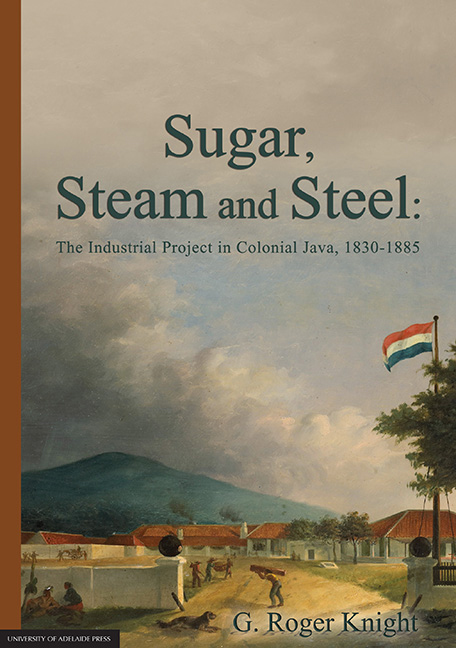Book contents
- Frontmatter
- Contents
- Abbreviations and Glossary
- Acknowledgements
- Introduction: Java Sugar, an Industrial Project and the ‘Oriental Cuba’, 1830-85
- Part I The ‘Industrial Revolution’ in Sugar Manufacture
- Part II The ‘Peasant’ Economy, the Money Trail and the Bourgeoisie
- 4 Sugar without Slaves: The Agrarian Basis for the Industrial Project
- 5 The Money Trail: State, Suikerlords and Bourgeoisie
- Part III Metamorphosis
- Conclusion: The Future of an Industrial Project: The 1880s and Beyond
- Archival Sources
- Bibliography
4 - Sugar without Slaves: The Agrarian Basis for the Industrial Project
from Part II - The ‘Peasant’ Economy, the Money Trail and the Bourgeoisie
Published online by Cambridge University Press: 24 October 2017
- Frontmatter
- Contents
- Abbreviations and Glossary
- Acknowledgements
- Introduction: Java Sugar, an Industrial Project and the ‘Oriental Cuba’, 1830-85
- Part I The ‘Industrial Revolution’ in Sugar Manufacture
- Part II The ‘Peasant’ Economy, the Money Trail and the Bourgeoisie
- 4 Sugar without Slaves: The Agrarian Basis for the Industrial Project
- 5 The Money Trail: State, Suikerlords and Bourgeoisie
- Part III Metamorphosis
- Conclusion: The Future of an Industrial Project: The 1880s and Beyond
- Archival Sources
- Bibliography
Summary
Sugar is associated — perhaps indelibly — with plantations and slaves. Java, as things developed during the middle decades of the nineteenth century, had neither: or, at least, not in any way that related to the production of sugar. The ‘sugar plantation’ as conceived in the heavily Caribbean-centric literature did not exist there (or was found only on the margins of the industry). Neither did slavery, nor the indentured forms of labour that (in part) supplanted it in the New World and elsewhere. Ostensibly at least, commodity sugar production, as it developed on Java, belonged instead to a general, long-established, ‘Asian’ pattern, in which cane was raised by a ‘peasant’ workforce, utilising existing farm-land in conjunction with other crops.
As we shall see, a generalisation as broad as this runs the risk of seriously misrepresenting the agrarian basis of production that evolved in Java through the mid-century decades. Nonetheless, it does serve to highlight the major disparity between how the industry's raw material was produced and the classic situation of contemporaneous New World sugar manufacture. In the Dutch colony, the sugar industry expanded rapidly between the 1830s and 1880s, primarily but not exclusively under the aegis of the Cultuurstelsel or System of [State] Cultivations, which was inaugurated at the beginning of the period by Governor-General Johannes van den Bosch and his lieutenants. In contrast to the barrack slavery of transported Africans and the dominant monoculture of contemporary Cuba — Java's Caribbean antipode — Java sugar's expansion was predicated on raw material produced by local, peasant labour from cane fields that were created by the temporary amalgamation of scores of often minute irrigated rice fields or sawah. The sawah amalgamated in this way, however, remained within the domain of peasant agriculture and reverted to ‘peasant’ cropping once the cane had been harvested — whereupon a fresh set of fields was prepared for the planting of the next season's sugar harvest. This was the famous system of wisselbouw or crop rotation which singled out Java's sugar industry from virtually all its major global counterparts.
Production of the industry's raw material did indeed take on some plantation-like characteristics, particularly after the Cultuurstelsel began to be phased out from about 1870 onwards. Over the course of time, cane ceased to be a ‘peasant’ crop in any meaningful sense of that word and came under the direct and close supervision of industry personnel.
- Type
- Chapter
- Information
- Sugar, Steam and SteelThe Industrial Project in Colonial Java, 1830-1885, pp. 95 - 132Publisher: The University of Adelaide PressPrint publication year: 2015



